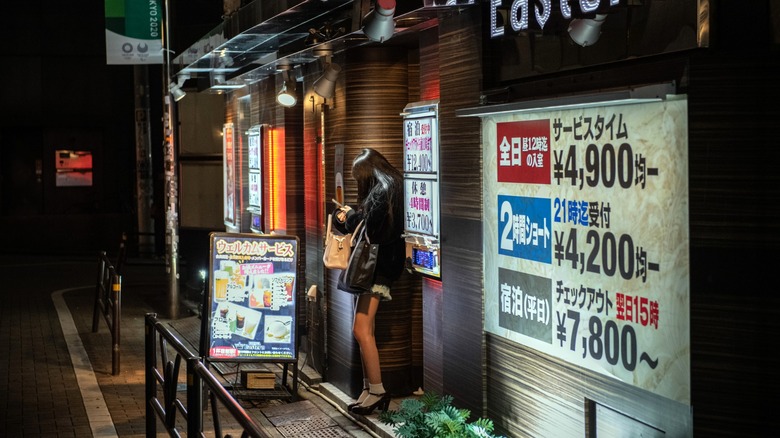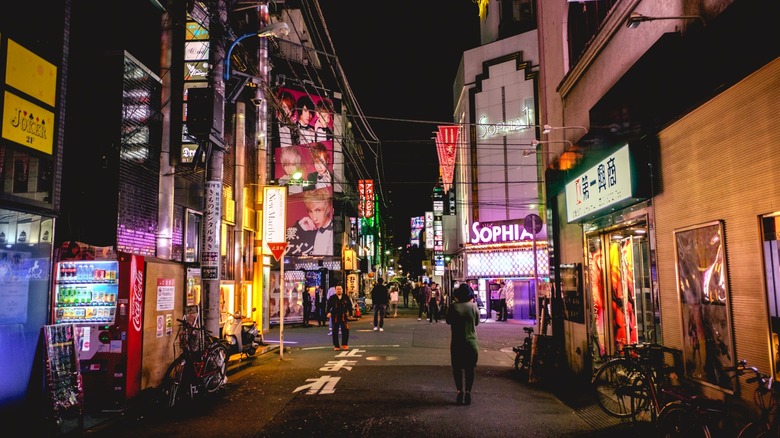What It Means To Stay In One Of Japan's 'Love Hotels'
In Japan, "love hotels" are short-term lodgings that cater to those looking for a private space to be intimate. Love hotels are found in cities all over the country and are especially prevalent in denser urban areas such as Osaka and Tokyo, where you will find clusters of these establishments close to nightlife areas and red light districts.
What does it mean to stay in a love hotel? Well, you will be part of a broad demographic. Everyone from one-night lovers to committed couples frequent love hotels, along with gigolos, sex workers, and many others with libido on the mind. If that conjures unpleasant images for you, don't worry. This is Japan, a nation where pointed etiquette is extended from the dining table to public transport, luxury golf courses, and even love hotels. Consequently, guests can expect discretion, cleanliness, and very limited staff exposure, if any at all.
When you enter the lobby, you won't find a receptionist but a display with rooms, prices, and payment facilities. Hotels in Europe often request to see your passport before check-in, but that is not the case at Japan's love hotels. These accommodations don't even ask for ID, because love hotels are all about anonymity. In the majority of cases, check-in will be entirely digital or involve a brief transaction with a staff member obscured by opaque glass.
What to expect from your love hotel
Japan is well known for its luxury capsule hotels, but such accommodation doesn't quite cut it for the romantically inclined. Happily, love hotels tend to be spacious with all the amenities reasonably expected of a mid-range hotel room, including en suite bathrooms, skincare products, and TVs, which distinguish themselves with a generous selection of pornographic channels, just in case rose petals and bubbly on ice doesn't cut it.
Some love hotels offer more than just a place to lie down with your partner. Don't be surprised to find mirrored ceilings, vibrating beds, BDSM furniture, and the kind of accessories you'd see at Adam & Eve. The more elaborate hotels are designed to resemble hospital rooms, airplane cabins, prison cells, and even medieval castles, facilitating all manner of role play preferences.
Perhaps the central unique selling point of love hotels are the stay options. Unlike traditional hotels, love hotels do not offer accommodation on a strict nightly basis. Instead, most establishments offer two options: "rest" and "stay." Guests who choose "rest" are entitled to stay for a short period of time. A typical "rest" stay will last a few hours, although they may be as brief as just 30 minutes. The "stay" option is better suited to those who arrived late — typically after 10 p.m. — and intend to stay overnight. Check-out time for "stay" guests is broadly similar to conventional hotels, at 11 a.m. or midday.
Are love hotels sketchy?
Although love hotels are all about discretion, total privacy cannot be guaranteed. You may pass other guests in communal spaces, and it is anyone's guess who they will be. In most cases, they will be regular couples looking for intimacy. However, sex workers and their clients may be present, too, and age gaps — typically older men with much younger women — may be obvious.
In some love hotels, privacy extends to deception. For example, to minimize the risk of phone calls from suspicious partners, adulterers can stay in rooms that play ambient noise to convince their partner they are in public. Dishonorable though that may be, love hotels are likely safer than the average sketchy motel in the United States. After all, Japan is among the safest countries in the world with a homicide rate of just 0.7 per 100,000 inhabitants in 2023. So, if you and a loved one find yourself in the overlooked city of Kawasaki or Tokyo's trendy Shibuya district, consider a "rest" or a "stay" in a love hotel.


